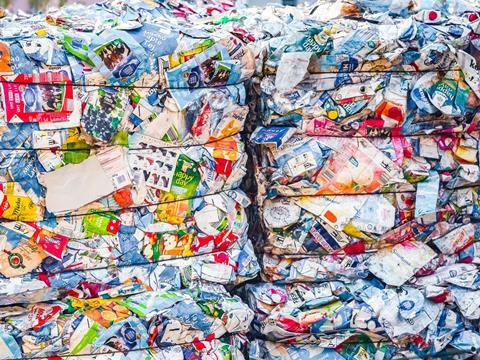
In a joint development agreement, Dow and P&G aim to create a new recycling technology that converts hard-to-recycle plastic packaging into ‘near-virgin quality’ recycled polyethylene with a low greenhouse gas emissions footprint.
Each company will contribute its own patented technologies and knowledge to develop a dissolution process. Dissolution uses a solvent to separate and purify polymers from each other, or from any additives present.
A range of plastic materials is set to be encompassed by the new technology, although it will focus on polyethylene and post-household plastic waste – especially hard-to-recycle packaging structures, like rigids, flexibles, and multi-layer designs.
It is anticipated that the resultant technology will produce high-quality post-consumer recycled polymer and reduce the greenhouse gas emissions footprint of fossil-based polyethylene. P&G expects to use the post-consumer recycled polymer in its packaging, in turn cutting down on waste and making the most of available resources.
Dow and P&G’s global partnership will commence immediately and is expected to continue until commercialization. It hopes to align with Dow’s Transform the Waste sustainability target, in which three million metric tons of circular and renewable solutions would be commercialized by 2030; while P&G aims to design 100% of its consumer packaging for recycling or reuse within the same time frame.
“Dow is committed to transforming plastic waste into circular solutions that can be made into high quality resins demanded by our customers while helping to accelerate a circular economy,” said Dave Parrillo, vice president for Research & Development, Dow Packaging & Specialty Plastics and Hydrocarbons. “We are excited to work with P&G who has similar sustainability goals and commitment to innovation.”
Lee Ellen Drechsler, senior vice president of Corporate Research and Development at Procter & Gamble, added: “Our partnership with Dow helps P&G advance our objective to scale industry solutions as we help create a circular future where materials are recycled and remade instead of becoming waste.”
The news comes after Mura Technology announced the opening of its first commercial-scale HydroPRS advanced plastic recycling plant last October. The facility is set to process ‘unrecyclable’ flexible and rigid mixed plastics, converting them into recycled hydrocarbon feedstocks for repeated plastic production.
Kao Corporation has also created a film-to-film recycling technology for used refill packs, which it has incorporated into a layer of its Attack ZERO liquid laundry detergent packaging; while Enviro Systems and Chalmers University of Technology have commenced a three-year project to develop the ‘next generation’ of pyrolysis-based recycling technology and help decarbonize West Sweden’s chemical industry.
If you liked this story, you might also enjoy:
Report: The ultimate guide to global plastic sustainability regulation
The Brief: Oxo-(bio)degradables: the who, what, and why of breaking down fossil-based plastics
Sustainable Packaging Summit: How Kraft-Heinz uses collaboration to drive innovation
The Brief: Using ocean-bound plastic in packaging – how, why and should we?














1 Reader's comment